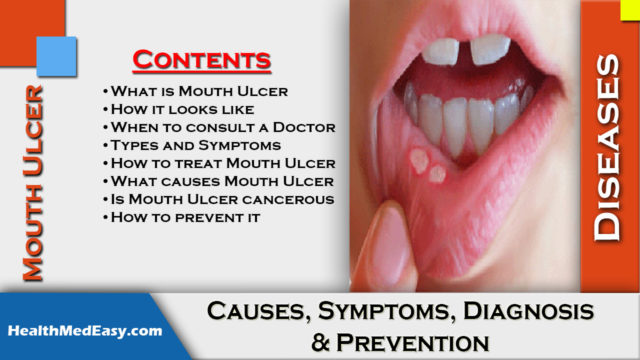Jump to
What is Mouth Ulcer and how it looks like?
Mouth ulcer which known as ‘canker sores‘ small, round or oval sores, mostly harmless, can be extremely uncomfortable, painful lesions are commonly developed in mouth or gums area especially on the cheeks, lips, tongue. Lesions can have red edges with other colors (i.e. yellow, white, gray) in the middle. It makes difficulties for some people to eating, drinking, talking and brush their teeth. It usually not contagious and cleared up automatically by 1-2 weeks.
When to consult a Dentist or a GP?
The mouth ulcer is very common and people need not worry about. It can be safely treated at home. But if following conditions happen you should be checked it up by a specialist.
- You should consult your dentist or GP if symptoms persist more than 3 weeks
- If there is an unusual amount of pain feeling and change in color to red. So, there’s a chance to have bacterial infection occurred and you have to treat it with antibiotics.
- If you have frequent and severe ulcers is developing.
- Unusually large size
- If you have painless sores
- If mouth ulcer is spreading
- If mouth ulcer is developing after starting a new medication
- If fever appears
Types and Symptoms
There are mainly three types of mouth ulcers which are described below. Extreme amounts of its developments can cause fever, sluggishness, and swollen glands.
- Minor: Minor mouth ulcer is small (can be 2mm to 8mm in size) and oval or round shaped sores that vanish automatically within 1-2 weeks. You need
not be worried if this type of mouth ulcer developed. - Major: Major type has irregular edges and are larger, raised and penetrate deeper than minor type and can be a reason to worry about. It can take up to 5-6 weeks to be cleared up.
- Herpetiform Ulceration (HU): HU is a subtype of aphthous ulcers and named after the sores associated with herpes. Herpes is contagious but HU is not contagious, irregular-edged, pinpoint-sized, developed anywhere in the mouth in cluster form of 10 to 100, extremely painful due to food, drink, and poor oral hygiene. It tends to be developed more in females than males and is more common in older adults.
How to treat Mouth Ulcer?
1) Self Care
You need not do anything with most of the mouth ulcer. However, if you experience it extremely painful, then a number of things listed below you can do to decrease pain and speed up healing.
- Avoid hard, hot, salty, acidic and spicy food and drink until the ulcer cleared up properly
- Do a mouthwash using saltwater and baking soda
- Always use a soft toothbrush to wash your teeth
- Apply some ice to ulcer patches
- You can take nutritional supplements like vitamin B-6, vitamin B-12, folic acid, zinc, iron etc. which boosts healing.
- You can place some milk of magnesia or baking soda paste on the mouth ulcer
2) Pharmacy medicines suggested by a Dentist or GP
You can always check up by dentists or GP and apply antimicrobial mouthwash, protective paste or ointment recommended by your consultant.
What causes Mouth Ulcer?
Most of the cases the definite cause are unknown but following are the reasons which can be that factors that trigger mouth ulcer to be developed.
- Emotional anxiety, physical stress or lack of sleep
- Sodium lauryl sulfate which is found in various toothpaste and mouth cleansers.
- Hormonal changes during monthly periods, puberty, pregnancy, menopause etc.
- When you first quitting smoking may develop the mouth ulcer
- Food sensitivities to acidic or spicy foods like citrus, strawberries, pineapples, almonds, chocolate, tomatoes, coffee, peanuts, cheese, and wheat flour etc. Eating these types of foods can trigger mouth ulcer.
- Hard brushing, sports injury, accidental bitting the inside of your cheek or a sharp tooth, minor mouth injury from dental work, poor-fitting dentures, braces and other apparatus that may rub or damage the mouth and gums.
- Medications including beta-blockers, painkillers etc.
- Different medical conditions such as Coeliac disease, Crohn’s disease, Reactive arthritis, Behcet’s disease, a weakened immune system by HIV or lupus-like diseases, allergic response to mouth bacteria, viral or fungal infections (i.e. cold sore virus, chickenpox, and hand, foot and mouth disease) or a nutritional deficiency such as vitamin B-6, vitamin B-12, folic acid, zinc, iron etc. may trigger ulcers to develop.
- Genetic factors
Is Mouth Ulcer Cancerous ?
As stated above mouth ulcer are not things to worry about. It is completely different from mouth cancers. Follow the ‘When to consult a dentist or GP?‘ points and if you think there is something to be checked by a dentist or GP then you have to be careful enough. Following are the points you should know to the diagnosis about mount cancers.
- The mouth ulcer is generally painful but the mouth cancers not.
- It is healed up within 1-2 weeks but mouth cancers stay and spread gradually
- Ulcers developed due to mouth cancers are generally on or under the tongue area, back of the mouth, the gums, on the cheeks, though anywhere in the mouth can also occur.
- Mouth cancer paths are generally red with white or large white areas with hard, rough, and not easy to clear.
- People who are heavy drinkers, tobacco users or chain smoker have a higher risk of mouth cancer to occur.
How can Mouth Ulcer be Prevented?
Thankfully, mouth ulcer cleared on their own within 1-2 weeks and pain fades away in a couple of days. It may not be possible to stop development as there are some cases (such as illness and conditions, genetic factors) you can’t control. However, the following are the things you can maintain to reduce occurring frequency and numbers of patches.
- Consult with a doctor about mouth ulcer cause medications
- Avoid acidic or spicy foods like citrus, strawberries, pineapples, almonds, chocolate, tomatoes, coffee, peanuts, cheese, and wheat flour etc. Eating these types of foods can trigger it.
- Always use a soft-bristled brush which prevents from rubbing to gums.
- Use sodium lauryl sulfate free toothpaste
- Do some yoga daily which reduces emotional anxiety, physical stress or lack of sleep
- Avoid triggering causes which are explained above in the ‘What causes mouth ulcer?’ section.
- Brush after eating food and keep the mouth clean all day long.




